Quality Backlinks for SEO: What Should You Really Focus On? [+6 Tips]

OK, so how many emails have you opened this week asking you to insert backlinks across your site?
I am referring to emails like this:
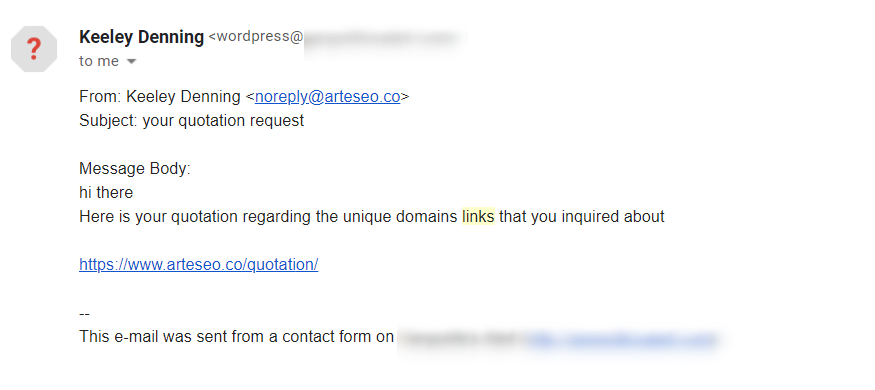
(Note: The recipient never requested a domain link quote, btw) :/
Companies spend thousands for marketers to earn them backlinks. Entire agencies exist for the sole purpose of building backlinks.
So what’s the big deal about backlinks? Google bots scan your site to choose your page rankings, external links, or links associated with other websites that point to your site are key factors. These links are called inbound links or backlinks. Every website that points links to your website is an endorsement of your content in Google’s eyes. The more sites that vouch for you, the better.
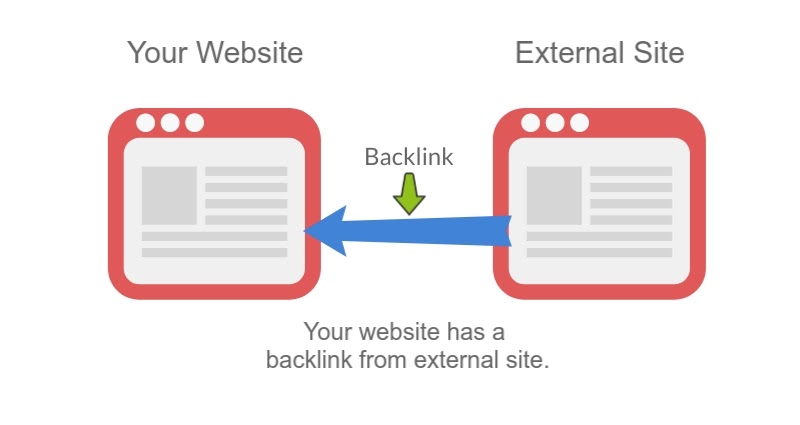
This has created an entire industry dedicated to inserting inbound links around the web. Some strategies are legitimate – others not so much.
So is a link building campaign really worth the time, money, and effort?
It depends.
On one hand, link building certainly doesn’t matter as much as some SEO marketers claim. However, if you choose to do a link building campaign, there’s a right and wrong way to build backlinks:
RIGHT: Creating awesome content people want to link to, naturally.
WRONG: Buying unnatural inserted backlinks or using manipulative tactics – aka black hat SEO.
Here’s why and how to build a healthy backlink strategy for sustainable SEO and traffic.
How Important is Link Building Anyway?
Link building certainly matters. It plays a key role in a well-rounded SEO strategy and broader digital marketing strategy – but not in the way most marketers think.
Yes, Google’s bots look at your backlinks as they scan your domain and pages to rank your URLs. However, the algorithms don’t just look at the backlinks and call it a day. They also care about:
- The trustworthiness and authority of the domain linking to your site.
- The anchor text was chosen to hyperlink your website.
- Whether the content on the linking page is relevant.
- How the backlinks got onto the page.
Backlinks are one of the most common – and most exploited – ways to game the Google ranking system. You can bounce back from honest mistakes like minimal keyword stuffing, but Google takes link schemes more seriously than people realize.
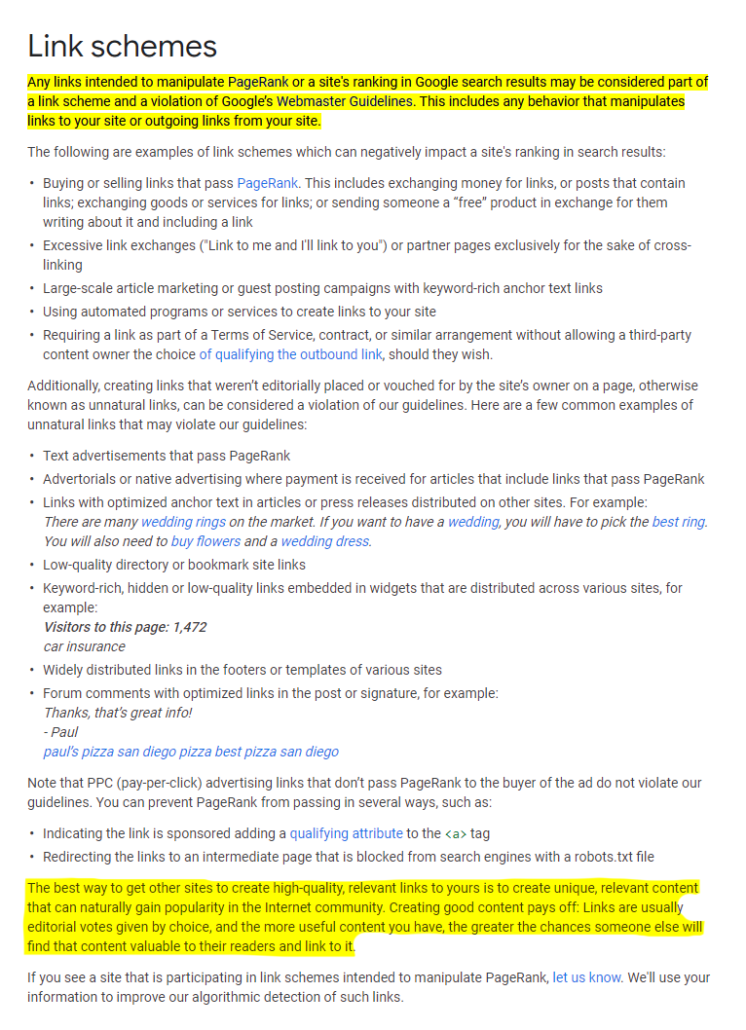
Google wouldn’t invest so much attention to punishing manipulative backlink tactics if inbound links weren’t a major ranking factor. So, they must be pretty important.
However, the real digital marketing value of backlinks comes from the fact that they’re links.
When you take time to research relevant sites, share quality content, and connect with other sites, the beauty of linking comes to life.
Backlinks let you build branding and relationships with other domains. You can reach new audiences and develop sustainable long-term traffic.
When developing a link building campaign, or better worded – building your brand through a link building campaign, relationships should always take priority over backlinks.
Think of it this way: If Google suddenly disappeared, would your brand identity and traffic still exist?
Diverse economies are more sustainable because they don’t rely on a single market – like oil – to survive. SEO and website traffic are both the same way.
Link building is only one part of a successful comprehensive marketing strategy. Brands must look at the bigger picture and create a holistic strategy. After putting forth goals and a content marketing strategy, you can figure out how links fit into reaching those goals. Look for ways links can amplify your message and structure the customer journey.
What is Domain Authority and How Much Does It Matter in Link Building?
Domain Authority (DA) or Authority Score is a ranking score Moz developed to predict how well a page will rank in SERPs.
Many people might not realize that Domain Authority is not a technical factor Google uses to rank pages – it’s comparative scoring, not absolute. It’s only meant to give you an idea and starting place.
Moz gives each domain a score between one and 100 – based on several factors (but mostly links) – to judge how well a website’s content should rank in SERPs.
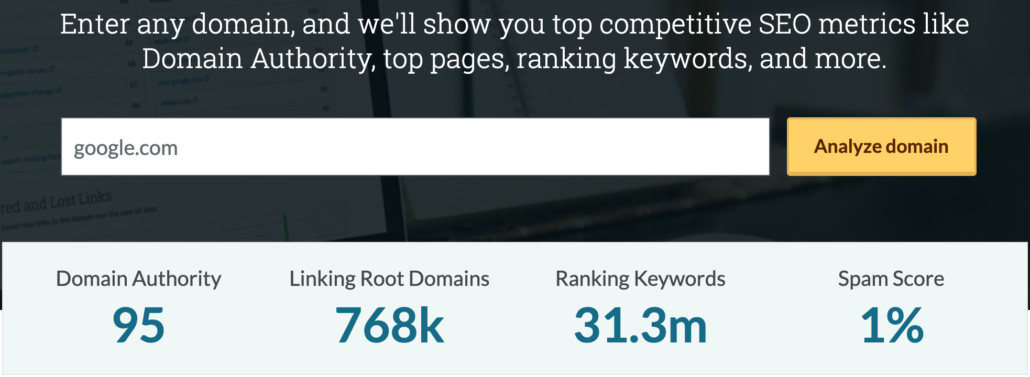
While your Domain Authority is useful for gauging your overall links and SERP rankings, it’s not a make-or-break metric you should stress over.
Why? I’ve noticed the following:
I’ve outranked countless sites with higher DA than my own likely because my domain is often more relevant than high DA competitors. (I focus on the value of targeted content marketing, user intent, and strong brand messaging over link building.)
A high DA backlink is useless to me in terms of both traffic and SEO if the website’s content isn’t relevant and high-quality.
6 Tips for Sustainable Link Building, Traffic, and SEO
Not every link is a “good” link – not for SEO and certainly not for traffic either.
For example, it’s easy to see why you’d rather have a bunch of links pointing to your site from Wikipedia rather than David Icke.
Don’t adopt a “take what you can get” attitude with your backlinks. Be proactive with link building—research every domain. Search out domains you’d LOVE to point at your site.
Kevin Rowe of PureLinq recommends developing your own set of criteria to evaluate and score site quality for potential backlinks.
(And don’t be afraid to strategically use the Google disavow tool when bad backlinks become a problem.)
1. Focus on Content – Yours AND Theirs
Study a potential website’s content, paying close attention to key points:
- Is the content niche or general?
- Red flag spam keywords like gambling, porn, or loans.
- Is the website updated regularly?
- Navigation should look useful and detailed.
- Do you see a ton of sponsored (paid) content?
Ideally, you want to build links from sites with an audience overlap and avoid sites designed explicitly for link schemes.
2. Investigate the Administration Policies
Head over to the website’s About page to see what they’re all about. You should find a few names of real people or an organization and at least a brief background.
A physical address is also a good sign, signaling the domain belongs to a legitimate operation. Any legit publisher should include submission guidelines as well.
If any website blatantly advertises prices for do-follow links, that’s a huge red flag. Links pointing to your website from these domains can get you into deep water with Google.
3. Analyze Their Backlink Profile
If you see hundreds or thousands of links pointing to a single URL, that’s not a promising sign. This can happen when another site links to the domain in a footer or sidebar (Google doesn’t like that, btw).
Also, note where the links are coming from. If the domain in question claims to publish content about fitness equipment, but you see hundreds of links from music forums, that sounds like spam.
Look at the link anchor text. Is it all keyword-stuffed, or do they have a nice balance of branded, naked, and partial keyword anchors?
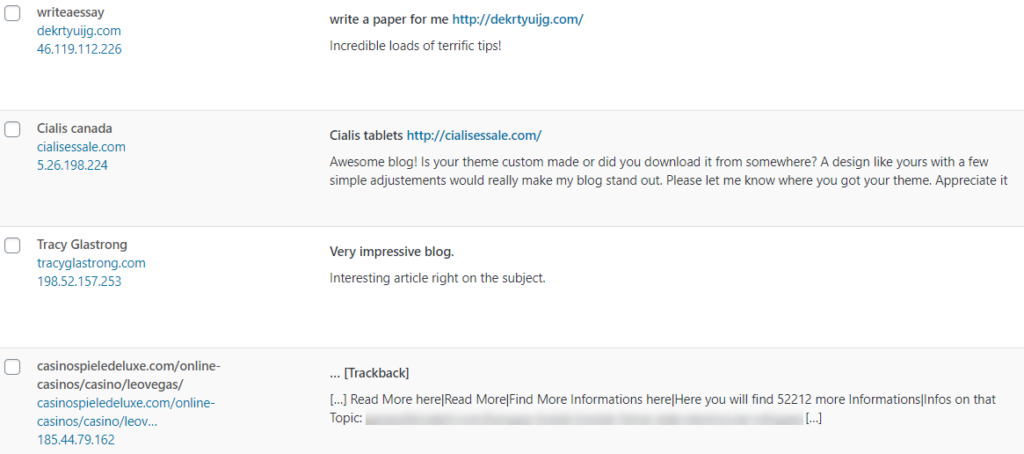
Pro Tip: SEMRush is one of many tools I use to scope out backlink profiles of other websites, including competitors.
4. Perform Some Recon
Who’s creating the site’s content? Do you recognize the brand and the contributors?
Not everyone is famous, obviously. You should, however, at least find a byline and link to their social media profiles.
Writers should be proud of their work. WordPress author labels like “staff writer” signal you’re dealing with some kind of spam.
5. Investigate the Writers and Pages
Reputation matters. That’s the whole reason you want to build links, right? You want to improve your reputation in both the eyes of your audience and Google bots.
Check the domain’s presence on social media. They might not have the most massive following, but are their followers engaged?
Are there any key influencers associated with the operation? (Pay attention because any links will associate your brand with them, too.)
If the outlet only has a few dozen followers or no page at all, run away.
Pro Tip: You can use tools like Buzzsumo to identify Influencers in your industry.
What’s the Site’s Traffic and SEO Like?
Your target sites should have engaged and targeted traffic. They should rank for more keywords and pages than just that of their homepage.
Look for sites with low bounce rates, decent time spent on each page, and active (regular) visitors.
You take your own metrics seriously, right? The sites that point to yours should, too.
Build a Well-Rounded SEO and Link Building Strategy
Our award-winning experts at JS-Interactive focus on the bigger picture behind backlinks. Relationships come first; links come second.
There aren’t any overnight cures for traffic or SEO, but there are tactics to build a sustainable long-term strategy.
When was the last time you updated your SEO strategy? Check out our vast SEO services and then schedule a free consultation to talk about your goals.